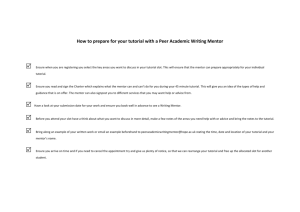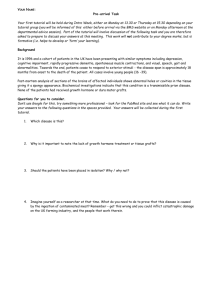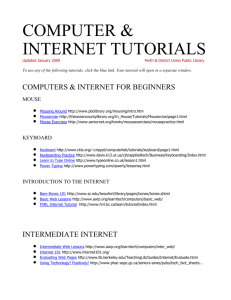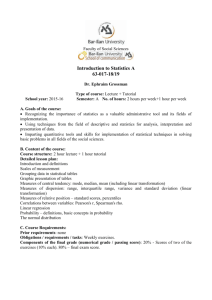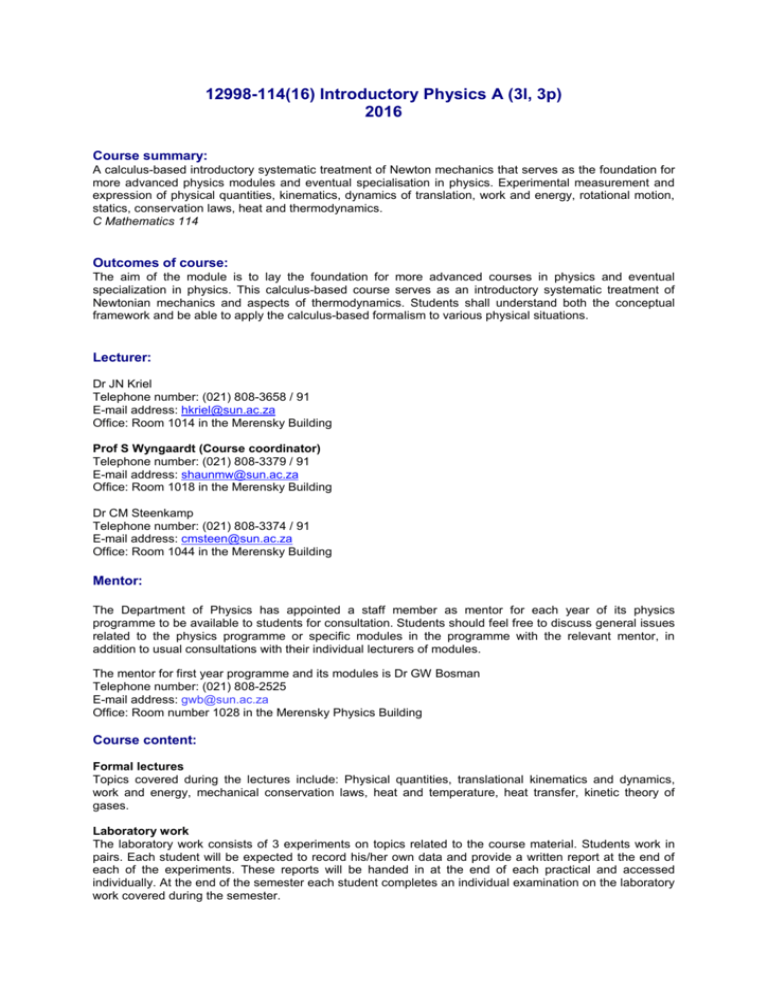
12998-114(16) Introductory Physics A (3l, 3p)
2016
Course summary:
A calculus-based introductory systematic treatment of Newton mechanics that serves as the foundation for
more advanced physics modules and eventual specialisation in physics. Experimental measurement and
expression of physical quantities, kinematics, dynamics of translation, work and energy, rotational motion,
statics, conservation laws, heat and thermodynamics.
C Mathematics 114
Outcomes of course:
The aim of the module is to lay the foundation for more advanced courses in physics and eventual
specialization in physics. This calculus-based course serves as an introductory systematic treatment of
Newtonian mechanics and aspects of thermodynamics. Students shall understand both the conceptual
framework and be able to apply the calculus-based formalism to various physical situations.
Lecturer:
Dr JN Kriel
Telephone number: (021) 808-3658 / 91
E-mail address: hkriel@sun.ac.za
Office: Room 1014 in the Merensky Building
Prof S Wyngaardt (Course coordinator)
Telephone number: (021) 808-3379 / 91
E-mail address: shaunmw@sun.ac.za
Office: Room 1018 in the Merensky Building
Dr CM Steenkamp
Telephone number: (021) 808-3374 / 91
E-mail address: cmsteen@sun.ac.za
Office: Room 1044 in the Merensky Building
Mentor:
The Department of Physics has appointed a staff member as mentor for each year of its physics
programme to be available to students for consultation. Students should feel free to discuss general issues
related to the physics programme or specific modules in the programme with the relevant mentor, in
addition to usual consultations with their individual lecturers of modules.
The mentor for first year programme and its modules is Dr GW Bosman
Telephone number: (021) 808-2525
E-mail address: gwb@sun.ac.za
Office: Room number 1028 in the Merensky Physics Building
Course content:
Formal lectures
Topics covered during the lectures include: Physical quantities, translational kinematics and dynamics,
work and energy, mechanical conservation laws, heat and temperature, heat transfer, kinetic theory of
gases.
Laboratory work
The laboratory work consists of 3 experiments on topics related to the course material. Students work in
pairs. Each student will be expected to record his/her own data and provide a written report at the end of
each of the experiments. These reports will be handed in at the end of each practical and accessed
individually. At the end of the semester each student completes an individual examination on the laboratory
work covered during the semester.
Practical (Tutorials):
Tutorials will occur each week. On days where practical laboratory work is also scheduled, the session will
commence with a tutorial of one hour to be followed by the practical until 17:00. During tutorial sessions in
which there is no scheduled practical the tutorial shall end at 17:00. There will be 6 practical sessions for
laboratory work. During the tutorial sessions students have the opportunity to solve problems related to the
course work and to participate in other activities to enhance their understanding of the content covered
during the lectures. During each tutorial session students should expect to produce work that will contribute
to their class mark. The nature of assignments and assessments will be varied.
Study material:
Prescribed textbook: "University Physics"
(Pearson/Addison-Wesley, 14th edition) by Young and Freedman.
Learning opportunities:
1. Tutorials (weekly, either 1 hour or 3 hours in duration).
2. A selection of lecture material available on SUNLearn (formats will be varied)
3. Solutions to selected problems available on SUNLearn.
4. Practicals
5. ePhys exercises on selected topics (SUNLearn)
Assessment:
Methods of Assessments
Tutorial problems, tutorial tests, homework assignments, group work, in-class quizzes
Class test
Practical laboratory reports
Examination
Venue and time of assessment opportunities
Tutorial tests: during a tutorial session
Class test: Click on the timetables link in the toolbar at the top of the page
Exam: Click on the timetables link in the toolbar at the top of the page
Supplementary exam: Click on the timetables link in the toolbar at the top of the page
Calculation of class mark:
Tutorials, homework, other assignments and practical report mark: 50% (laboratory work and the other
assessments will be weighted roughly evenly)
Class test: 50%
Calculation of final mark for the module:
Examination mark: 60%
Class mark: 40%
Admission to examination:
A class mark of at least 40% should be attained in order to qualify for the exam.


